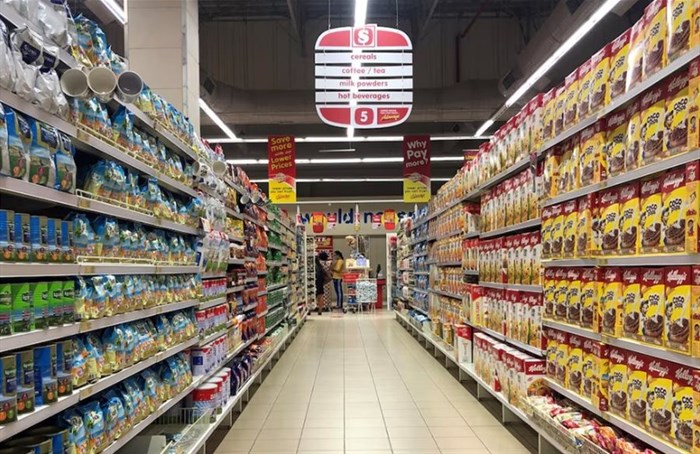Shoprite, a leading South African grocer which owns brands such as Checkers, House & Home, OK, Uniq and Computicket, seemingly can’t put a foot wrong when it comes to proving their resilience in the market.

Source: Reuters
The group has shown remarkable growth across all of its major retail store chains - Shoprite, Checkers/Checkers Hyper and Usave – by recently delivering double digit growth for its half-year sales performance.
Nqobile Dludla 6 Mar 2024 According to Moneyweb, interim results are as follows:
- Group sales of merchandise increased by 13.9% to R121.1bn
- Supermarkets RSA sales of merchandise increased by 14.6% to R97.5bn
- Diluted headline earnings per share (Dheps) increased by 7.6% to 621.4 cents (2023: 577.5 cents)
- Interim dividend per share increased by 7.7% to 267 cents (2023: 248 cents)
- Shoprite Group opened a net number of 369 stores during the past 12 months
- The group’s supermarket operations created 2,202 new jobs over the six months
- The Checkers and Checkers Hyper division delivered 13.7% growth in sales
- On-demand delivery by Checkers Sixty60 increased sales by a further 63.1% over the six months
- Shoprite increased sales by 13.1%
- Shoprite, with the inclusion of 51 (Cambridge) stores acquired from Massmart Holdings Ltd, increased sales by 13.2%
- The group’s limited assortment discounter, USave increased sales by 12.3%
Reasons for these positive numbers may include the group’s decision to consolidate its business across the continent and rather place a firm focus on its existing core business within South Africa.
This focus has primarily been on seven categories where the average market share has been under-indexed to get them back to their average index which has contributed significantly to Shoprite’s growth trajectory.
One of the most noteworthy aspects of Shoprite's strategy is its seamless integration of digital channels and advanced technology. From the development of an AI-powered pricing tool to the Checkers Sixty60 on-demand delivery service (which has generated an estimated R10bn annually, and created over 10,000 new jobs), Shoprite has leveraged technology to enhance the shopping experience and stay ahead of the competition.
This emphasis on innovation underscores the importance of staying agile and embracing technological advancements to meet evolving consumer preferences.
Shoprite's strategic approach to store expansion also demonstrates a keen understanding of local demographics and community needs. By tailoring store offerings to match the unique demands of each locale and forging partnerships with local businesses, Shoprite has managed to create a truly immersive shopping experience that resonates with customers across diverse regions.
In addition to its focus on customer satisfaction, Shoprite has also taken a proactive stance on sustainability, aligning its business practices with environmental and social responsibility. From renewable energy adoption to eco-friendly packaging initiatives, Shoprite's commitment to sustainability not only attracts conscientious shoppers but also contributes to long-term business resilience.
Key learnings
As retailers reflect on Shoprite's remarkable success, there are several key learnings to be gleaned.
To begin with, a deep understanding of the target market and a commitment to meeting their needs is essential for driving growth and fostering customer loyalty. Retailers must invest in market research and data analytics to gain insights into consumer preferences and behaviour, allowing them to tailor their offerings accordingly.
Shoprite has elevated their success by comprehending and serving the communities they operate in, introducing tailored stores within stores that bring familiar brands such as Starbucks, Krispy Kreme, and Kauai into strategic locations.
Following on from that, embracing technology and innovation is key to providing a competitive edge in an increasingly digital landscape. Retailers should explore opportunities to leverage advanced technologies such as AI, machine learning, and data analytics to enhance the shopping experience, streamline operations, and drive sales.
Then it is crucial to tailor store offerings to match local demographics and community requisites to create meaningful shopping experiences. Retailers should take a localised approach to store expansion, carefully selecting locations and curating product assortments to meet the unique needs of each market.
Entrenching loyalty is also key. In a time when shoppers are making sure that every cent is accounted for, if a retailer can capture their market, half the battle is already won. For example, Shoprite has gone to great lengths to ensure that their brand is not only top of mind, but loved by consumers. The expansion of their Checkers 60/60 brand is case in point.
After starting with delivery bikes, the brand moved into selling branded toys that consumers snapped up, and now they have expanded into selling a range of fun clothing that has gone viral across social platforms, driving sales and building awareness.
Finally, prioritising sustainability and corporate social responsibility can not only attract socially conscious consumers but also future-proof the business against environmental and social risks.
Shoprite’s sales performance serves as a testament to the power of strategic vision, innovation, and customer-centricity in driving retail success. By heeding the lessons learned from Shoprite's journey, retailers can position themselves for sustainable growth and resilience in an ever-changing market environment.





































